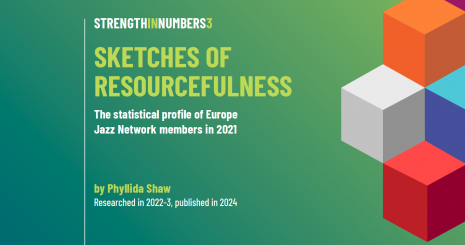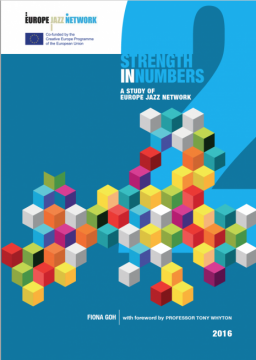Back to list
Audience Development: Catania Jazz - back to black
Sicily’s Catania Jazz has been a consistent voice for jazz in the region for nearly 35 years. Promoting a mixture of upcoming new talent, Italian jazz and a sprinkling of big names, the organisation was founded in 1983 with a performance by the Sun Ra Arkestra, and has welcomed virtually every major jazz artist to the island since then, including Dizzy Gillespie, Chick Corea, Ornette Coleman and McCoy Tyner, as well as being a platform for little known musicians. The organisation receives very little in subsidy, with no local council support, and a small government grant that equates to less than 20% of the total budget. The remaining income is raised through ticket sales from a supportive audience.
The audience for this well-regarded jazz series is loyal and committed, and is the jewel of the organisation, as Pompeo Benincasa explains: “Four years ago, we had serious cashflow problems as the government grant we receive is paid in arrears. In debt with the bank, and unable to find the money to continue, we had the choice to cancel the rest of the season, including refunds that we couldn’t afford, or to appeal to our audience. We offered them a ‘black season ticket’ (an abbonamento al buio) for the next year’s concert series at a reduced price, and were able to raise enough money to keep the current season going.” Audiences bought into the idea of the season ticket literally in the dark, as the next year’s programme, musicians and venues were not confirmed, so they were buying based purely on trust. In that first year, 150 season tickets for the next season were sold and the season was a huge success.
Audience members started asking about when they could buy the next year’s season ticket, so the tradition of selling ‘black season tickets’ carried on and the numbers of sales for advance season tickets has continued to grow. From 150 in year one to 250 in the second year, last season some 550 advance season tickets were sold – again, without a confirmed programme – and this season has already exceeded this, totalling more than 860 tickets sold in advance. This means that their small venue, seating 200 and staging three nights of the same band, is already sold out for next season and there are only tickets left for events at the 900-seat theatre. The cost of the season ticket is priced to encourage purchase, as there are significant savings to be made by buying in advance; this year’s season ticket sold for €130 for 14 concerts – or the same price per event as seeing La La Land, as Benincasa suggests – whereas individual tickets for high profile events in the season, such as John Scofield this season, are priced at more than €50. In a neat inversion of the programming difficulties that can accompany organisations so heavily reliant on ticket sales – whereby organisations feel the pressure to draw in audiences with guaranteed box office hits – Catania has managed to retain both artistic freedom and financial security.
Catania Jazz offers a season ticket for 14 events priced at not much more than the cost of three individual tickets for its highest profile artists’ concerts. This is a win-win situation for artists and audiences, as the inherent financial logic in buying a season ticket means that audiences are guaranteed for artistically riskier and more experimental events. Equally, the beauty of selling out many events in advance means that the budget for publicity and marketing is very low. Catania Jazz relies upon a well-managed audience database of some 6,000 people and social media to do the majority of its event marketing, with very little spent on print media. Its staff and volunteers ensure that data on customers attending individual events is gathered efficiently, and the organisation stays in touch with its audience by e-mail, text or through its Facebook page, which has some 22,000 likes. Catania Jazz has repeated its success in its Palermo season, where it has sold nearly 400 advance season tickets, again selling out its smaller venue.
Pompeo attributes the success of the advance sales to three main factors: “The first is trust – from 1983, we have promoted jazz in Catania without a break. Everyone who knows about jazz knows about us, and we draw audiences from across Sicily. All the big names have performed here several times but our audience will watch many young musicians and bands they don’t know – we obligate them to pay for artists they don’t know but our audiences are happy. We are sure about the quality of the music we recommend to our audience and it means that we can offer the stage to young musicians – we don’t need to have the stars.” The second factor is the sense of community that the events inspire, and the backing by its core audience of well-educated arts lovers, keen to support local events, particularly in the light of the local council’s lack of help. Finally, finding the right programming mix is crucial, as ever, and Catania Jazz is particularly committed to encouraging the next generation of audience. Benincasa is convinced that programming rather than pricing is the crucial factor for younger audiences, and Catania’s attractive ticket offers for under-26s, such as buy-one-get-one-free for two under 26 tickets or €1 for an under 26 to attend with a full paying adult - are no guarantee of success. “Artists can simply open the door to young people and are more important than price. My 20 year old son was excited about us bringing Kinga Glyk, and it’s important that we have the future of the audience in mind when programming. If we don’t capture the young audience then we have no future.”
The audience for this well-regarded jazz series is loyal and committed, and is the jewel of the organisation, as Pompeo Benincasa explains: “Four years ago, we had serious cashflow problems as the government grant we receive is paid in arrears. In debt with the bank, and unable to find the money to continue, we had the choice to cancel the rest of the season, including refunds that we couldn’t afford, or to appeal to our audience. We offered them a ‘black season ticket’ (an abbonamento al buio) for the next year’s concert series at a reduced price, and were able to raise enough money to keep the current season going.” Audiences bought into the idea of the season ticket literally in the dark, as the next year’s programme, musicians and venues were not confirmed, so they were buying based purely on trust. In that first year, 150 season tickets for the next season were sold and the season was a huge success.
Audience members started asking about when they could buy the next year’s season ticket, so the tradition of selling ‘black season tickets’ carried on and the numbers of sales for advance season tickets has continued to grow. From 150 in year one to 250 in the second year, last season some 550 advance season tickets were sold – again, without a confirmed programme – and this season has already exceeded this, totalling more than 860 tickets sold in advance. This means that their small venue, seating 200 and staging three nights of the same band, is already sold out for next season and there are only tickets left for events at the 900-seat theatre. The cost of the season ticket is priced to encourage purchase, as there are significant savings to be made by buying in advance; this year’s season ticket sold for €130 for 14 concerts – or the same price per event as seeing La La Land, as Benincasa suggests – whereas individual tickets for high profile events in the season, such as John Scofield this season, are priced at more than €50. In a neat inversion of the programming difficulties that can accompany organisations so heavily reliant on ticket sales – whereby organisations feel the pressure to draw in audiences with guaranteed box office hits – Catania has managed to retain both artistic freedom and financial security.
Catania Jazz offers a season ticket for 14 events priced at not much more than the cost of three individual tickets for its highest profile artists’ concerts. This is a win-win situation for artists and audiences, as the inherent financial logic in buying a season ticket means that audiences are guaranteed for artistically riskier and more experimental events. Equally, the beauty of selling out many events in advance means that the budget for publicity and marketing is very low. Catania Jazz relies upon a well-managed audience database of some 6,000 people and social media to do the majority of its event marketing, with very little spent on print media. Its staff and volunteers ensure that data on customers attending individual events is gathered efficiently, and the organisation stays in touch with its audience by e-mail, text or through its Facebook page, which has some 22,000 likes. Catania Jazz has repeated its success in its Palermo season, where it has sold nearly 400 advance season tickets, again selling out its smaller venue.
Pompeo attributes the success of the advance sales to three main factors: “The first is trust – from 1983, we have promoted jazz in Catania without a break. Everyone who knows about jazz knows about us, and we draw audiences from across Sicily. All the big names have performed here several times but our audience will watch many young musicians and bands they don’t know – we obligate them to pay for artists they don’t know but our audiences are happy. We are sure about the quality of the music we recommend to our audience and it means that we can offer the stage to young musicians – we don’t need to have the stars.” The second factor is the sense of community that the events inspire, and the backing by its core audience of well-educated arts lovers, keen to support local events, particularly in the light of the local council’s lack of help. Finally, finding the right programming mix is crucial, as ever, and Catania Jazz is particularly committed to encouraging the next generation of audience. Benincasa is convinced that programming rather than pricing is the crucial factor for younger audiences, and Catania’s attractive ticket offers for under-26s, such as buy-one-get-one-free for two under 26 tickets or €1 for an under 26 to attend with a full paying adult - are no guarantee of success. “Artists can simply open the door to young people and are more important than price. My 20 year old son was excited about us bringing Kinga Glyk, and it’s important that we have the future of the audience in mind when programming. If we don’t capture the young audience then we have no future.”






